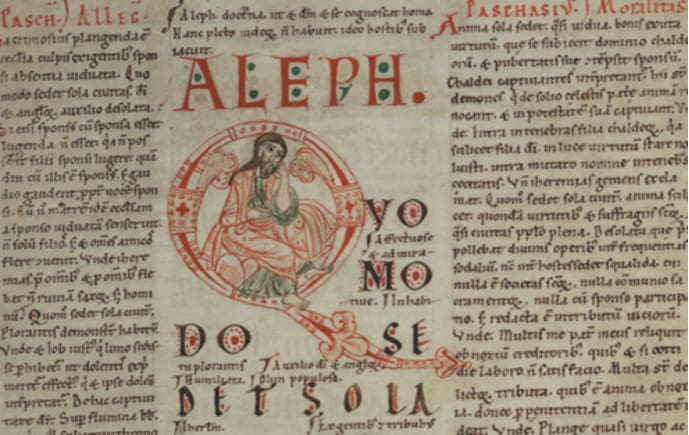Dear Friends and Colleagues,
Before I knew there was a book in the Bible titled Lamentations – or The Lamentations of Jeremiah – I was introduced to a musical setting of the first two chapters of the book by Thomas Tallis (d. 1585). The Chapel Choir of Dickinson College sang this setting sometime in the mid-1970s when I was in college. In addition to the emotional content of the music itself, I was struck by the form the piece had. After the incipit (opening words of the text, Hear ye the lamentation of Jeremiah the prophet), the choir sang the first letter of the Hebrew alphabet: ALEPH – in repetitious but contrapuntal style. We then sang the first lamentation, beginning with a lone tenor voice singing How doth the city sit in loneliness that was once so full. After a cadence at the end of the first lamentation, the key changed and we sang the second letter of the Hebrew alphabet: BETH. The symmetry, the pattern, the form which the text had, had some kind of appeal to me – it was eliciting some kind of emotion. Apart from the content (what was being said or sung), and even the very beautiful musical setting (which reflected well the form of Hebrew poetry), the form itself was affecting me in some way.
From this rather impressionistic beginning, I then went on to study the Book of Lamentations more thoroughly in seminary. It was written sometime around the fall of Jerusalem in 587 BCE and is an achingly beautiful piece of poetry whose impact is felt well beyond the mere words used. Kathleen M. O’Connor, Professor Emerita of Columbia Theological Seminary in Decatur, Georgia, writes this in her commentary on the book in the New Interpreter’s Bible (Abingdon Press, 2001): Lamentations is a searing book of taut, charged poetry on the subject of unspeakable suffering. The poem emerges from a deep wound, a whirlpool of pain, toward which the images, metaphors, and voices of the poetry can only point. … Its stinging cries for help, its voices begging God to see, its protests to God who hides behind a cloud – all create a space where communal and personal pain can be reexperienced, seen, and perhaps healed. (p. 1013)
The Book of Lamentations is written in acrostic form, that is, each line starts with a specific letter that, going down the poem, spells out a word or short phrase or, in the case of Lamentations, the Hebrew alphabet. So, ALEPH: How lonely sits the city that was once full of people! How like a widow has she become, she that was great among the nations! She that was a princess among the cities has become a vassal. BETH: (Verse 2) GIMEL: (Verse 3) all the way through the 22 letters of the Hebrew Alphabet to TAW (Verse 22). One might think that as a writer, if you wanted to express pain and suffering in writing, why restrict oneself by having to fit into a somewhat artificial form? But the opposite of this is true, especially with respect to Lamentations. In essence, the author (The book is traditionally ascribed to the prophet Jeremiah.) says: I can list the pain, suffering and woundedness of my people from “A to Z” and still not be finished, the woundedness is so great; the suffering so profound!
Chapters 1, 2, and 4 are acrostics that are dirges for the dead city of Jerusalem, written as if for a funeral liturgy. Chapter 3 is a triple acrostic (66 verses) with an individual “speaker” voicing the sadness of the desolate people. And Chapter 5, while not formally an acrostic, has 22 verses and speaks more broadly about the national crisis. The entire book is a small psalter of expression of great pain, suffering, and yet … hope. Restore us to yourself, O LORD, that we may be restored; renew our days as of old – (Lamentations 5:21)
When, in my own prayer life, I’m feeling the weight of the world, heightened anxiety about the way things are, and an accompanying feeling of powerlessness to do something about it that will have any effect whatsoever – I turn to the Book of Lamentations, whose words never fail to offer hope. The Steadfast love of the LORD never ceases, his mercies never come to an end; they are new every morning; great is thy faithfulness. (Lamentations 3:22-23)
With love in Christ,
+Mary

